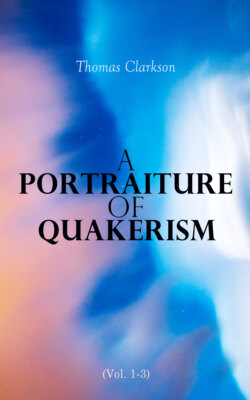Читать книгу A Portraiture of Quakerism (Vol. 1-3) - Thomas Clarkson - Страница 21
На сайте Литреса книга снята с продажи.
SECT. IV.
ОглавлениеThe theatre forbidden—because injurious to the happiness of man by disqualifying him for the pleasures of religion—this effect arises from its tendency to accustom individuals to light thoughts—to injure their moral feelings—to occasion an extraordinary excitement of the mind—and from the very nature of the enjoyments which it produces.
As the Quakers consider the theatre to have an injurious effect on the morality of man, so they consider it to have an injurious effect on his happiness. They believe that amusements of this sort, but particularly the comic, unfit the mind for the practical performance of the christian duties, and that as the most pure and substantial happiness, that man can experience, is derived from a fulfilment of these, so they deprive him of the highest enjoyment of which his nature is capable, that is, of the pleasures of religion.
If a man were asked, on entering the door of the theatre, if he went there to learn the moral duties, he would laugh at the absurdity of the question; and if he would consent to give a fair and direct answer, he would either reply, that he went there for amusement, or to dissipate gloom, or to be made merry. Some one of these expressions would probably characterise his errand there. Now this answer would comprise the effect, which the Quakers attach to the comic performances of the stage. They consider them as drawing the mind from serious reflection, and disposing it to levity. But they believe that a mind, gradually accustomed to light thoughts, and placing its best gratification in light objects, must be disqualified in time for the gravity of religious exercise, and be thus hindered from partaking of the pleasures which such an exercise must produce.
They are of opinion also, that such exhibitions, having, as was lately mentioned, a tendency to weaken the moral character, must have a similarly injurious effect. For what innovations can be made on the human heart, so as to seduce it from innocence, that will not successively wean it both from the love and the enjoyment of the Christian virtues?
The Quakers also believe, that dramatic exhibitions have a power of vast excitement of the mind. If they have no such power, they are insipid. If they have, they are injurious. A person is all the evening at a play in an excited state. He goes home, and goes to bed with his imagination heated, and his passions roused. The next morning he rises. He remembers what he has seen and heard, the scenery, the language, the sentiments, the action. He continues in the same excited state for the remainder of the day. The extravagant passions of distracted lovers, the wanton addresses of actors, are still fresh upon his mind. Now it is contended by the Quakers, that a person in such an excited state, but particularly if the excitement pleases, must be in a very unfavourable state for the reception of the pure principle, or for the promotion of the practical duties of religion. It is supposed that if any religious book, or if any part of the sacred writings, were handed to him in these moments, he would be incapable of enjoying them; and of course, that religious retirement, which implies an abstraction from the tilings of the world, would be impracticable at such a season.
The Quakers believe also, that the exhibitions of the drama must, from their own nature, without any other consideration, disqualify for the pleasures of religion. It was a frequent saying of George Fox, taken from the apostle Peter, that those who indulged in such pleasures were dead, while they were alive; that is, they were active in their bodies; they ran about briskly after their business or their pleasures; they shewed the life of their bodily powers; but they were extinct as to spiritual feeling. By this he meant that the pleasures of the theatre, and others of a similar nature, were in direct opposition to the pleasures of religion. The former were from the world worldly. They were invented according to the dispositions and appetites of men. But the latter were from the spirit spiritual. Hence there was no greater difference between life and death, than between these pleasures. Hence the human mind was made incapable of receiving both at the same time; and hence the deeper it were to get into the enjoyment of the former, the less qualified it must become of course for the enjoyment of the latter.
